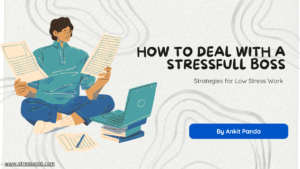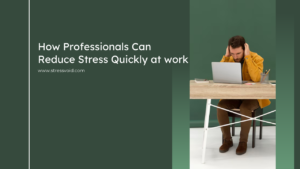Life’s a very tough game, isn’t it? Between crushing it at work, keeping up with family, and trying to carve out a little “me time,” it’s easy to feel like you’re done with this. Modern life is very tough—endless emails, tight deadlines, and that nagging feeling you’re not doing enough anywhere. I’ve been there, staring at my laptop at 11 p.m., wondering how the day slipped away and the point is I have not done anything that day.
That’s where stress management comes in, not as some buzzword, but as a real way to take back control of your precious life.
Let’s be honest: stress doesn’t just mess with your head—it can tank your energy, strain your relationships, and even make you feel physically lousy, and the scary part is it can sometimes put you in the hospital. Figuring out how to manage stress isn’t about adding another task to your tight schedule; it’s about finding simple ways to breathe easier and feel more balanced. Today, I’m sharing practical stress management strategies that I’ve seen work (and tried myself!) to help you find that sweet spot between work and life—without losing your sanity.
Table of Contents
Understanding Stress in the Context
of Work-Life Balance
Between work demands and personal responsibilities, it’s easy to get crushed.
Let’s break down where this stress comes from, how it messes with our lives, and why getting a handle on stress management is a game-changer for us and our loved ones.
Let’s break down where this stress comes from, how it messes with our lives, and why getting a handle on stress management is a game-changer for us and our loved ones.
Common Sources of Stress
We’ve all been there—staring at a never-ending work email thread while the laundry is on hold and food is getting cold. Long work hours can eat up your energy, leaving little for anything else. Family responsibilities, like caregiving or keeping the household running, pile on the pressure. And don’t get me started on the lack of boundaries—when your boss Slacks you at 9 p.m., or you’re still thinking about that meeting during family dinner.
These are the culprits that make us feel like we’re running on fumes, and they’re all too common when you’re trying to balance work and life.
Learn how to deal with a stressful boss.
How Chronic Stress Impacts Productivity, Relationships, and Health
At work, you might notice you’re less focused, missing deadlines, or just not bringing your A-game, in short you can’t do your best. It’s hard to be creative or efficient when your stressed out. At home, stress can make you short-tempered, pulling you away from meaningful moments with loved ones.
I’ve had days where I’m so frazzled, I barely listen what my loved ones are saying—and that’s not fair to either of us.
Then there’s your health: chronic stress can lead to headaches, trouble sleeping, or even bigger issues like anxiety or a weaker immune system. It’s a vicious cycle, and it hits every part of your life. Consult a doctor if you are facing these constantly.
The Role of Stress Management in Creating Harmony Between Work and Personal Life
Here’s the good news: stress management isn’t just about calming down in the moment—it’s about building a life where work and home feel more in sync. By learning to manage stress, you’re setting yourself up to show up fully for both your job and your personal life. It’s like tuning an instrument—when you get it right, everything sounds better. For me, simple things like taking a quick walk or saying “no” to extra tasks have made a huge difference. It’s not about eliminating stress (because, let’s be real, life happens), but about handling it so you can enjoy your time at work and still have energy for the people and hobbies you love.
Core Stress Management Strategies

Juggling work deadlines, family time, and maybe a moment to just breathe can feel like a circus act. I’ve been there—overwhelmed, stretched thin, and wondering how to keep it all together. Over time, I’ve learned that managing stress isn’t about eliminating it (because, let’s be real, life happens). It’s about finding practical ways to handle it so you can enjoy both your work and personal life. Here are four core strategies that have helped me find that sweet spot of work-life balance, with stress management woven in naturally.
A. Time Management Techniques
Time is sneaky—it slips away when you’re not looking. Getting a grip on it can make a huge difference in how stressed you feel. Here’s what works for me:
- Prioritizing tasks using the Eisenhower Matrix:
This is my go-to for figuring out what actually needs my attention. I grab a piece of paper and split it into four boxes: urgent and important, important but not urgent, urgent but not important, and neither. Then I sort my to-do list into these boxes. It helps me focus on what matters and ditch the stuff that’s just noise. Less clutter in my brain, less stress.
- Setting realistic boundaries between work and personal time:
I used to check work emails at 10 p.m.—big mistake. Now, I set clear cut-off times, like no work after 7 p.m. unless it’s an emergency. I also let my team know when I’m “off the clock.” It’s not perfect, but it gives me space to unwind and be present with my family or just myself.
- Scheduling downtime to recharge:
I block out time in my calendar for “me time,” even if it’s just 15 minutes to read or sip coffee in peace. Treating it like a meeting makes it non-negotiable. Those little breaks are like mini stress management sessions—they keep me grounded.
B. Mindfulness and Relaxation Practices
You don’t need to be a Zen master to bring some calm into your day. These small practices have been game-changers for me when stress starts creeping in.
- Incorporating short meditation or breathing exercises during the workday:
When I’m frazzled, I take five minutes to do a quick breathing exercise—inhale for four counts, hold for four, exhale for four. I do it at my desk or even in my car. It’s like hitting the reset button on my brain. Apps like Calm or Headspace make it easy if you want a guide.
- Practicing gratitude to shift focus from stressors:
I keep a tiny notebook where I jot down three things I’m grateful for each day. It could be a good meeting, a sunny day, or my kid’s laugh. It sounds cheesy, but it pulls me out of the stress spiral and reminds me life’s not all bad.
- Using progressive muscle relaxation to release physical tension:
When I’m tense, I notice my shoulders are practically at my ears. I do a quick progressive muscle relaxation trick: starting from my toes, I tense each muscle group for a few seconds, then release. By the time I get to my head, I feel looser and less like a human stress ball.
C. Physical Wellness for Stress Reduction
Your body and mind are connected, so taking care of the physical side is a huge part of keeping stress in check. Here’s what I focus on:
- Importance of regular exercise to boost mood and energy:
I’m not running marathons, but a 20-minute walk or some yoga in my living room does wonders. Exercise releases those feel-good endorphins, and I swear it makes me less snappy. Even a quick stretch during a break helps me shake off stress.
- Nutrition tips to support stress resilience:
I try to eat balanced meals with protein, veggies, and healthy fats—it keeps my energy steady. I also drink water like it’s my job because dehydration makes me cranky. If I’m stressed, I avoid overloading on caffeine or sugar; they just make me jittery.
- Prioritizing sleep hygiene for better recovery:
Sleep is my secret weapon. I aim for seven hours and stick to a routine: no screens 30 minutes before bed, a dark room, and maybe some white noise. When I’m rested, I handle stress way better, and I’m not a zombie at work or home.
D. Building a Support System
You don’t have to go it alone. Having people in your corner makes stress feel less like a solo battle. Here’s how I lean on others:
- Communicating needs with colleagues, managers, or family members:
I’ve learned to speak up when I’m overloaded. At work, I’ll tell my boss if I need to shift deadlines. At home, I ask my partner to take over dinner duty sometimes. Being honest about what I need cuts down on resentment and stress.
- Seeking professional help when needed:
There was a time when I felt stuck, and talking to a therapist helped me sort through it. Coaches or counselors can offer tools tailored to you. It’s not a sign of weakness—it’s smart stress management.
- Joining communities or groups for shared experiences:
I joined a local book club, and just chatting with others about life (not just books) is a relief. Online groups, like forums or social media communities, can also be great for swapping tips or venting. Knowing I’m not alone makes stress feel lighter.
Practical Tips for Implementation
Life gets hectic, and finding ways to keep stress in check can feel like another task on the to-do list. But with a few simple, intentional steps, you can weave stress management into your daily routine without it feeling like a chore. Here’s how I’ve learned to make it work in my own life, and I think these tips can help you too.
A. Creating a Personalized Stress Management Plan
Let’s be real—there’s no one-size-fits-all when it comes to handling stress. What works for me might not vibe with you, and that’s okay. Start by jotting down what stresses you out most—maybe it’s a packed work schedule or juggling family time. Then, pick one or two things that feel doable to ease that tension. For me, it’s a quick morning walk to clear my head. Your plan could include five minutes of deep breathing, a nightly journal session, or even scheduling a coffee break to decompress. Keep it simple, make it yours, and tweak it as you figure out what clicks.
B. Using Technology Mindfully
I’m all for using tech to make life easier, but it’s gotta be intentional. There are some awesome apps out there that can help with stress management without sucking you into a screen-time spiral. I use a meditation app for a 10-minute wind-down before bed—it’s like a mini-vacation for my brain. Time-tracking apps are great too; they help me see where my hours go and stop me from overstuffing my day. Try something like Headspace for guided relaxation or Toggl for keeping tabs on your time. Just set a limit so you’re not scrolling endlessly—tech should be a tool, not a trap.
C. Avoiding Common Pitfalls
I’ve fallen into these traps before, and trust me, they can derail your efforts fast. Overcommitting is my biggest one—saying “yes” to every work project or social invite until I’m running on fumes. Now, I’m learning to say “no” or “let me check my schedule” to protect my energy. Another biggie is neglecting self-care. Skipping meals, skimping on sleep, or ditching exercise might feel like time-savers, but they just crank up your stress. I try to treat self-care like a non-negotiable meeting—eating a decent lunch or getting to bed on time isn’t selfish, it’s essential.
D. Tracking Progress and Adjusting Strategies as Needed
You don’t have to be perfect at this, but checking in with yourself helps. I like to do a quick mental recap at the end of the week—did my morning walk make me feel calmer? Was I still frazzled by Thursday? If something’s not working, switch it up. Maybe swap out a meditation app for a yoga video or try batching work tasks to free up evenings. I keep a small notebook to scribble what’s helping and what’s not—it’s less formal than it sounds, just a way to stay honest with myself. Over time, you’ll figure out what keeps you balanced and what needs a refresh.
Long-Term Benefits
Let’s be real—life can feel like a juggling act sometimes, with work deadlines, family time, and personal goals all vying for attention. That’s where stress management comes in, not just as a quick fix but as a game-changer for the long haul. When you get a handle on stress, the benefits ripple out, making both your work and personal life feel more manageable and even enjoyable. Here’s what you can look forward to when you stick with it.
A. Improved Productivity and Focus at Work
Ever notice how stress can make your brain feel like it’s wading through molasses? When you practice stress management, you clear that fog. You’re not just powering through tasks—you’re actually focused, making smarter decisions and getting stuff done without feeling like you’re running on empty. Whether it’s tackling a big project or just keeping up with emails, you’ll find you’ve got more mental bandwidth to bring your A-game to work.
B. Stronger Personal Relationships and Emotional Well-Being
Stress has it’s own way of making us short-tempered or distant with the people we care about most. But when you’ve got solid stress management habits, you’re more present and patient—whether it’s laughing with your partner, playing with your kids, or catching up with friends. Plus, you’re not just surviving emotionally; you’re actually thriving. You’ll feel more grounded, less overwhelmed, and ready to nurture the relationships that matter.
C. Enhanced Overall Health and Resilience Against Future Stressors
Chronic stress can wreak havoc on your body—think sleepless nights, constant fatigue, or even random aches and pains. By weaving stress management into your routine, you’re giving your body a fighting chance. Better sleep, more energy, and a stronger immune system become your new normal. And the best part? You’re building resilience, so when life throws the next curveball (because it will), you’re better equipped to roll with it instead of spiraling.
Wrapping Up
Alright, let’s wrap this up! We’ve covered some solid stress management strategies to help you find that sweet spot between work and life. From prioritizing tasks and setting boundaries to sneaking in mindfulness breaks and leaning on your support system, these tips are all about keeping stress in check without overcomplicating things. The key is to create a balance that feels right for you—whether it’s a quick breathing exercise during a hectic workday or carving out time for a walk to clear your head.
Don’t feel like you have to do it all at once. Start small—maybe try one strategy this week—and stick with it. Little changes add up, and before you know it, you’ll feel more in control and less frazzled. I’ve been there, juggling deadlines and family time, and trust me, even tiny tweaks can make a big difference.
So, what’s your go-to way to manage stress? Drop a comment below and share a tip that works for you, or pick one strategy from this post to try out this week. Let’s keep the conversation going and help each other find that work-life balance we’re all chasing!



